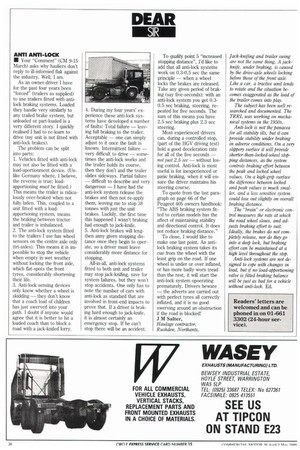ANTI ANTI-LOCK • Your "Comment" (CM 9-15 March) asks why
Page 32

If you've noticed an error in this article please click here to report it so we can fix it.
hauliers don't reply to ill-informed flak against the industry. Well, I am.
As an owner-driver I have for the past four years been "forced" (trailers as supplied) to use trailers fitted with antilock braking systems. Loaded they handle very similarly to any trailed brake system, but unloaded or part-loaded is a very different story. I quickly realised I had to re-learn to drive (my unit is not fitted with anti-lock brakes).
The problem can be split into parts: 1. Vehicles fitted with anti-lock may not also be fitted with a load-aportionment device. (Unlike Germany where, I believe, the reverse is true; loadapportioning must be fitted.) This means the trailer is ridiculously over-braked when not fully laden. This, coupled to a unit fitted with a loadapportioning system, means the braking between tractor and trailer is imbalanced.
2. The anti-lock system fitted to the trailers I use has wheel sensors on the centre axle only (tri-axles). This means it is impossible to stop the vehicle when empty in wet weather without locking the front axle, which flat-spots the front tyres, considerably shortening their life.
3. Anti-lock sensing devices only know whether a wheel is skidding — they don't know that a coach load of children has just swerved into your path. I doubt if anyone would agree that it is better to hit a loaded coach than to block a road with a jack-knifed lorry. 4. During my four years' experience these anti-lock systems have developed a number of faults: Total failure — leaving full braking to the trailer. Acceptable — one can simply adjust to it once the fault is known. Intermittent failure — very difficult to drive — sometimes the anti-lock works and the trailer holds its course, then they don't and the trailer slides sideways. Partial failure — difficult to describe and very dangerous — I have had the anti-lock system release the brakes and then not re-apply them, leaving me to stop 38 tonnes with just the unit brakes. Lucidly, the first time this happened I wasn't braking had enough to jack-knife.
5. Anti-lock brakes will lengthen army given stopping distance once they begin to operate, so a driver must leave considerably more distance for stopping.
All-in-all, anti-lock systems fitted to both unit and trailer may stop jack-knifing, save for system failures, but they won't stop accidents. One only has to note the number of cars with anti-lock as standard that are involved in front-end impacts to prove that. If a driver is braking hard enough to jack-knife, it is almost certainly an emergency stop. If he can't stop there will be an accident. To qualify point 5 "increased stopping distance", I'd like to add that all anti-lock systems work on 0.3-0.5 sec the same principle — when a wheel locks the brakes are released. Take any given period of braking (say five-seconds): with an anti-lock system you get 0.30,5 sec braking, steering, repeated for five seconds. The sum of this means you have 2.5 sec braking plus 2.3 sec steering.
Most experienced drivers can, during a controlled stop, (part of the HGV driving test) hold a good deceleration rate for all of the five seconds — not just 2.5 sec — without losing control. Anti-lock is most useful is for inexperienced or panic braking, when it will ensure the driver maintains his steering course.
To quote from the last paragraph on page 66 of the Peugeot 405 owners handbook: "The ABS braking system fitted to certain models has the affect of maintaining stability and directional control. It does not reduce braking distance."
To close, I would like to make one last point. An antilock braking system takes its cue from the wheel with the least grip on the road. If one wheel is under or over inflated, or has more badly worn tread than the rest, it will start the anti-lock system opoerating prematurely. Drivers beware — the adverts are carried out with perfect tyres all correctly inflated, and it is no good swerving around an obstruction if the road is blocked!
J M Salter,
Haulage contractor, Rushden, Northants, Jack-knifing and trailer swing are not the same thing. A jackknife, under braking, is caused by the drive-axle wheels locking before those of the front axle. Like a car, a tractive unit tends to rotate and the situation becomes exaggerated as the load of the trailer comes into play.
The subject has been well researched and documented. The TRRL was working on mechanical systems in the 1950s.
Anti-lock is not the Panacea for all stability ills, but it can provide stability under braking in adverse conditions. On a very slippery surface it will provide shorter-than-locked-wheel stopping distances, as the system controls braking effort between the peak and locked wheel values. On a high-grip surface the difference between locked and peak values is much smaller, and a less sensitive system could lose out slightly on overall braking distance.
The "brain" or electronic control measures the rate at which the road wheel slows, and adjusts braking effort to suit. Ideally, the brakes do not completely release, nor do they go into a deep lock, but braking effort can be maintained at a high level throughout the stop.
Anti-lock systems are not designed to cope with changes in load, but if no load-apportioning valve is fitted braking balance will be just as bad for a vehicle without anti-lock. Ed.
Readers' letters are welcomed and can be phoned in on 01-661 3302 (24-hour service).




































































































































































































